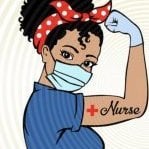Search the Community
Showing results for 'Complications'.
Found 17,501 results
-


JUST GIMME THE DANG SURGERY ALREADY!!!
AZhiker replied to Suzi_the_Q's topic in PRE-Operation Weight Loss Surgery Q&A
I had to do the 6 month thing, too, but it was a good time to really examine my own heart and decision, as well as research the surgery thoroughly. I watched every You-tube by Dr. Matthew Weiner, read books, and felt that my decision was based on good information and not from impulsion. I went into it scared, but knowing what I was getting into, and even with a couple of post op complications (blood clots and ulcer) I have no regrets what so ever. It has changed my life for ever and I AM NEVER GOING BACK! -


Blossom or Angeles Hospital Tijuana
Miss215 replied to Chrissy800's topic in Gastric Sleeve Surgery Forums
I head to Vegas to start Fast Track at Blossom, in 2 days, with surgery in 7 days. I have heard nothing but good things. The few negative reviews I’ve read were about billing issues, but by and large, they are well-reputed, so I’m feeling confident. I too initially looked into heading to Mexico, but was uneasy about coverage of potential post-op complications. Plus, once I found Blossom, realized it was all outpatient and got a great quote, I went full speed ahead. -
8.5 months out from pre-op & 6.5 months out from surgery not 1 complication at all just have to avoid sugar it will make you feel unwell...
-
Hello, just wanted to share my story. It’s quite unique, and I’m hoping I hear some positives because I’m so depressed. 17 years ago I had a gastric bypass. I was 345 lbs and due to terrible back, I decided to do the surgery. The bypass went well, no complications. When it was time to introduce solids, I simply couldn’t. Everything made me dump..soups, eggs, everything including shakes. I stopped eating and ended up having a reversal to save my life. The reversal happened 5 months after bypass. Since then I’ve suffered every single day with gerd. Now I have a hiatel hernia that’s 4 mm with a benign mass and an ulcer. I just saw a surgeon and he said no other option than to do a gastric bypass. It’s that or I could die from the growth of the mass and hernia. I think I’m most scared about food not agreeing with me again. Can those of you out at least 6 months and up to a couple of years share your diets with me?
-


GALS who started their journey over 300 lb+<br /> +
Miss215 replied to Frustr8's topic in The Gals' Room
This is me. My highest wt, which is also my starting weight, was 308. (I’m doing a self-pay outpatient procedure,so I wasn’t required to do monthly weigh-ins) I’m 5 days into the 2 wk pre-op diet and have dropped 4lbs already. If I had to guess, I think I’ll be somewhere around 293 or so come surgery day. I too am curious about how quickly I’ll drop the weight post-op,but I’m hoping for the best. At this point, I’m just praying for a speedy recovery and zero complications. -
Hi. I've been reading as many posts as I can for the last two months including this thread and I appreciate all of the insight and opinions. I just popped in to say after a GREAT DEAL of deliberation I have decided on the mini-gastric-bypass over the sleeve. The pros and cons equaled themselves. The final decision was made due to one important distinction. The MGB can be reversed. The Sleeve cannot. You can have surgery to go back to the way you were before WLS. This lightens the weight of "unknown complications causing a lifetime of misery" possibility. Just thought I'd share this.
-


How Fast is Fast Track
Miss215 replied to FinallyLosingIt20's topic in PRE-Operation Weight Loss Surgery Q&A
I’m actually headed to Blossom next Wednesday. Apparently, they can use certain benefits from your policy even if it explicitly excludes Bariatric Surgery. As it was explained to me,with my specific policy, they are able to use an out-of-network general surgery benefit to assist with costs. I wound up only paying $6k out of pocket. Blossom is literally the only way this would’ve happened for me, because I was hard and fast on not paying anymore than $7k for it. I think it’s utterly ridiculous that most insurance plans these days won’t cover it, yet they’ll pay for you to get your foot cut off from diabetes complications or other ailments that could probably have been FIXED with bariatric treatment. It’s maddening! -


Chronic hives after gastric sleeve
Tiff71 replied to Barbara V's topic in Gastric Sleeve Surgery Forums
Hi Barbara, I have just come across your post. I had a Gastric Sleeve almost two years ago. I had no complications and my diet, although smaller quantities, has not changed in any way. I have suffered from chronic hives since the surgery and never had them at any time in my life previously. I'm going through hell. Every morning I wake up with them all over my body...feet, hands, face, hair...everywhere. They are huge, raised, red lumps that itch like nothing on earth. My eyes are red and swollen. I take antihistamines which eventually take them down 2-3 hours later. I'm clueless as to what is causing this. I am in misery every day. There are cases like ours online but no studies or conclusions. -


Emergency Surgery - Adhesions & Intestinal Oclusion
ladybug76 posted a topic in Revision Weight Loss Surgery Forums (NEW!)
Hello there! Got revisión to RNY from sleeve on november 28th 2019 due to GERD and hiatal hernia. Got gallbladder removal at the same time. Got emergency surgery on May 3rd 2020 (10 days ago) A day before I felt sick, sharp pain in my tummy that came and went from a 5 to solid 10. Started vomiting at 5pm for a nonstop 12 hours period Arrived dehydrated at hospital, got a CT scan and fortunately they were able to fix me on time, before Any complication presented, like removing intestine or staying in ICU Adhesions covered my intestine at the jejunojejunal anastomosis (the spot where they stitch/unite 2 pieces of intestine) and so producing an intestinal oclusion. I was so scared and in pain. Thank God I am now recovering at home. Any one with similar experience out there? I would love to hear on intestine rehab, what you ate after and how long did it take you to be yourself again My best wishes to all journeys taking place all around the world. Be safe! P.s. Excuse my writing. I am mexican (spanish native language) and obviously my english is so rusty -


Surgery tomorrow - I’m scared!!
Ostflicka replied to Ilanarose's topic in PRE-Operation Weight Loss Surgery Q&A
Oh ok Friday! You got this Good Luck 🍀 and know we're rooting for you. Take advantage of the pain meds to get up and walk as soon as you can. Walking all the air they put into you before going home. Make sure you have all your pills you'll need at home to stay comfortable. Don't push yourself to do too much too fast. Stick to your surgeons instructions. They're not mean they're trying to help you so there are no complications. Be patient with yourself. New normal is weird. If your surgeon is like mine he wants you to have best possible outcome (then his numbers look good too) 😂 You go GIRL! 👏🏻 🎉 -
During coronavirus pandemic, I would be cautious about going to Mexico. Very little data is available on how widespread it is down there. And no testing being done. Another thing to consider is any complications you may have as a cash pay patient will not be covered by insurance, Some complications can require long hospital stay and cost 5 times the price of surgery. Also, patients need lifetime care with bariatric team to watch for vitamin and other deficiencies. Do you have a local bariatric center that will monitor you for years to come? Sent from my SM-T580 using BariatricPal mobile app
-


How much would YOU pay???
Lily66 replied to AlwaysCruising's topic in PRE-Operation Weight Loss Surgery Q&A
Mine was covered by insurance, but I AM SERIOUS— I recently retired past few years and told hubby, if insurance rejects me, the first $20k I spend in retirement will be for WLS. I now have the time and burning desire to GET HEALTHY and what use is money if.. A. We’re too unhealthy to enjoy it, or B. We’re dead from obesity complications. I would pay whatever it takes, search for the best surgeon available to me. That is just me, and reflective of my determination and the sense of urgency I felt and still feel. ..But many, many others on this board have expressed the same. “Decide what you want, decide what you’re willing to give up to get it, then go about your business.” Good luck, make wise decisions, never look back, except to SMILE at how far YOU have come and what a GRAND JOURNEY this REALLY IS!! -


Endoscopic Sleeve with Dr. Sadek in NJ, has anyone done this procedure with him?
Hop_Scotch replied to hope4momof4's topic in Endoscopic Sleeve Gastroplasty Forum
I had an ESG October 2018, I had a gastric sleeve March 2020. My ESG had some success initially, but then no longer felt any restriction, I put all the weight I had lost back on bar 5 kilos. An endoscope in February 2020, showed all but one or two of the sutures had come undone. I had chosen the ESG initally because I liked the idea of a non surgical weight loss procedure in which the recovery time was reduced. With the benefit of a massive does of hindsight, I wish I had the sleeve back in Oct 18. I had some discomfort with the sleeve, a different type of discomfort than the ESG but really the worse I could say about the recovery for the sleeve was a bad dose of contact dermatitis. I had rolling cramps for a few days with the ESG. I felt some type of cramp for a day or two with the sleeve when I swallowed liquid. I could have gone back to work sooner than I did with the sleeve, but took the time offered by the doctor. I definitely feel more restriction than I ever did with the ESG. Some people have had great success with the ESG, others not so much. They seem to fail for various reasons: overeating volumes allowed, lack of surgeon technique / knowledge and some fail for no apparent reason (sutures come undone regardless of excellent compliance or even good technique). My gastric sleeve surgeon said there seems to be mounting evidence that at best the ESG should be considered a temporary measure for people who can't have surgery due to being serverely overweight and need to lose weight quickly for an operation. Like i said though there have been some people who have had good success with the ESG for a decent period of time. I am a member of a few FB groups for ESG one of them is a group regarding ESG failure, a lot of active posters are from Australia where ESG failure seems to have a higher rate. ESG has only been in Australia for a few years so perhaps technique has a lot more to do with failures there. Some points to ask when meeting with the person doing your ESG: Rate of success/failure/complications. Of the successes how many of them are still active patients....you don't know if someone who drops off their books after six or 12 months still has restriction. If your ESG fails will they rectify it free of charge? Will their technique prevent a conversion to a gastric sleeve if needed (most surgeons will convert to a bypass only). How many people didn't lose weight due to loss of restriction. -


Surgery imminent...feeling increased panic this is stupid idea
sdjohnson7 replied to Ashliza's topic in General Weight Loss Surgery Discussions
I was sleeved on 2/27/2020. I was extremely nervous, but knew I needed to help myself. I was diabetic, HBP, arthritis and had sleep apnea. I had no complications during or after surgery, no gas pains or nausea. It’s only been 2 1/2 months and I have loss 5o lbs and no longer on meds for diabetes, no arthritis pain and only on half my dosage of HBP meds. I would do it all over again. Ultimately the choice is yours... I wish you well. -


Surgery imminent...feeling increased panic this is stupid idea
ms.sss replied to Ashliza's topic in General Weight Loss Surgery Discussions
@Ashliza ... Ultimately its up to you. While the surgery will definitely help you lose weight if you follow your plan, a lot of your success/failures and positive/negative experiences will depend on, and be affected by, your attitude and mindset. Nobody can predict the future, so it is very possible that you will suffer complications, OR gain all of your weight back. But the odds are you won't. The majority of WLS patients have very uneventful recoveries. The majority of WLS patents lose 60-70% of their excess weight and keep it off. Some lose more, some lose less. You won't know where you fall on the spectrum until you get there. I will say that I had a very similar pre-op experience as you. I kept changing my mind and second-guessing my decision about getting the sleeve done. I was approved way back in March 2016 and I started and stopped the process TWICE before I finally got into the right mindset of being confident with my decision...was sleeved in Oct 2018. I had no complications and lost all off my excess weight. I've very happy with my decision, only regret was that I just didn't get it done in 2016....but I guess I just wasn't ready yet. Good Luck! -


Pre-Surgery Advice: What do you wish you knew?
M_ishy replied to Rachel98's topic in Gastric Bypass Surgery Forums
Hello! I'm new here, but not new to gastric bypass. I had roux-en-y surgery in 2003. Prior to surgery, I needed insurance approval (mine was 100% covered by my insurance), to attend classes organized by the doctor's office, get bloodwork and other tests and have multiple doctors appointments. I was approved for surgery in February and had surgery on April 16, 2003 so I had a relatively short wait. I would absolutely do it all again. The surgery was done laparoscopically, and with no complications. I had a horrible reaction to the antibiotic given to me, so that would be my first suggestion to you - look into what antibiotics you'll be given. They knew I was allergic to penicillin, but the surgery taught me I'm allergic to anything in the penicillin family. I had a terrific support group before and after surgery. It was really the first time I had any friends. So, my second suggestion is to find in person support as well as online support. Knowing people who went through or were going through the same things I was was helpful and comforting. Dumping and throwing up still happens all these years later. Not as intense as it was in the beginning though. So, my third suggestion is to strategically place plastic bags around your house, car, purse, ect because sometimes you'll end up throwing up quick and won't be able to make it to the bathroom. By the way, throwing up after gastric bypass isn't as horrible as prior to surgery, but it might feel weird at first. I was so afraid the first time I threw up after surgery. I thought I had damaged my insides. Now, as far as the other end - when you start eating solid foods again your body may not like it and you'll just need to run to the bathroom fast. Seriously fast. I would suggest going very slowly when introducing foods back and make sure a bathroom is nearby. Prior to having surgery I tried out a bunch of different protein shakes so by the time supplementing my diet with protein shakes became a requirement I had favorites already lined up. I take vitamins supplements every day and have since my surgery. Also, I go bloodwork every six months just to make sure my body is getting what it needs. I have issues with iron, however, this was true before I had surgery. Good luck! -


New to the process
catwoman7 replied to Texaschick09's topic in PRE-Operation Weight Loss Surgery Q&A
no regrets at all - I'd do it again in a heartbeat. In fact, I'd do it every year if I had to! I've never heard of any correlation between WLS and pancreatic cancer. Most people have no complications at all or only minor ones that are easily fixable. And I've never heard of people getting pancreatic cancer from it. Once in a great while you'll hear of something like a bowel obstruction (this would be considered a major complication, but fortunately, it's very rare), but cancer, no. I've never heard or read about that anywhere, and I've been pretty active in the bariatric community for the last six years. On the other hand, I was facing all kinds of complications when I weighed 373 lbs, including an early death, most likely. WLS very likely saved my life. -
I had my lap band out in 2009. I was just miserable with it, constant reflux issues. Felt immediately better having had it removed. It was probably one of the easiest surgeries I've ever had and I had no complications. I was a little terrified that I'd gain all my weight back but noticed that my portion sizes were still small. I kept up my general lap band-like practices and my weight held steady UNTIL life handed me a big bag of stress and change. As a result, I started stress eating. Over the course of a year and a half, I gained all of my weight back. Fortunately, those pounds didn't bring too many extra friends to the party. Long story short, I had the sleeve in 2017 and am happy with that decision. Moral of the story: there IS life after the lap band. If you stay the course and do not return to bad habits, you'll keep your weight off. Best of luck to you!
-
Hi! I too had my LB for 11 yrs n finally got it removed in 2018 due to many prior unrelated medical issues n the best thing I could’ve done. Thank God surgery n recovery went well with no complications period. Also, unfortunately for me 4/6 months after surgery I developed an under active thyroid that caused an onset of various menopausal symptoms. Got put on thyroid medication for 5/6 months n HATED cuz it caused me a weight gain of 50 lbs. In addition another 20 pound weight gained on my own due to overall menopause issues. It’s now been almost 2 yrs where I’m no longer on any medication n all of my menopause symptoms/issues have little by little started to subside due to incorporating a better wellness nutritional/physical care of my overall wellbeing. Therefore, I’m now down 30 lbs out of the 70 gained n still slowly making progress. Wish u the best with ur choices n surgery is going to go well.
-
I am in the process of trying to get my band removed. I have had to for almost 11 years and feel that its time to come out based on all the new research coming out. I would love to hear everyones experience on their lapband removals. How was the surgery any complications and how is life now?
-


Blossom or Angeles Hospital Tijuana
Zoomzoom replied to Chrissy800's topic in Gastric Sleeve Surgery Forums
I can't speak for the Mexico option - I considered it but was concerned my insurance covering post op complications if any came up. I went with Blossom. I too read the negative reviews, but felt they mostly had to do with the financial part of it. I was more comfortable staying in the US, and so went with them. I had a great experience - they handle everything once you are there, and aside from a couple of hiccups involving ground transportation, all went great. Let me know if you have any questions about my experience. Sent from my SM-G975U using BariatricPal mobile app -


Coping with Stress During COVID-19: What Bariatric Patients Need to Know
PollyEster posted a topic in General Weight Loss Surgery Discussions
Coping with Stress During COVID-19: What Bariatric Patients Need to Know May 1, 2020 by Harold Bays, MD, FOMA, and Lydia C. Alexander, MD, FOMA Dr. Bays is Medical Director and President of the Louisville Metabolic and Atherosclerosis Research Center in Louisville, Kentucky. Dr. Alexander practices obesity medicine at Kaiser Permanente Medical Weight Management Group in San Francisco, California. Funding: No funding was provided. Disclosures: Harold Bays, MD, FOMA is Trustee, Chief Science Officer, and Lydia C. Alexander, MD, FOMA, is Secretary/Treasurer for the Obesity Medicine Association. During this most unique of times, as frontline healthcare workers and hospital staff, we frequently face difficulties when treating patients threatened by a rapidly increasing pandemic. This is made even more difficult with the stress of limited essential medical supplies. Among all the turmoil and disruption, the emergence of COVID-19 has created special challenges for patients with obesity. Many patients with obesity have impaired immunity, impaired lung function, sleep apnea, and hypoxia, making a virulent upper respiratory tract infection especially perilous. Added to this are obesity-related debilitation, immobility, orthopedic changes, polypharmacy, more limited access to medical/preventive care, and adiposopathic complications of diabetes mellitus, and cardiovascular disease.1 Collectively, patients with obesity are more susceptible to COVID-19 disease and have worse outcomes once infection occurs. For many bariatric patients, the rise of the novel coronavirus has created additional challenges, such as the effect of mental stress on their lives. Increased mental stress can worsen complications from obesity, such as hyperglycemia, high blood pressure, dyslipidemia, and might also worsen obesity itself. The good news is that if clinicians are attuned to the physical impacts of mental stress, then proactive measures can be taken to mitigate the potential adverse consequences of mental stress. Acute Stress, Chronic Stress and COVID-19 Acute, or short-term, stress is a function of the natural “fight or flight” response. One of the systems activated by the stress response is the sympathetic nervous system, which increases production of hormones epinephrine and norepinephrine. The acute stress response can be beneficial—it can increase visual acuity, decrease pain, increase blood flow, and boost the immune system. This complex sequence of hormonal changes and physiological responses helps people when they need to fight or flee to safety. Conversely, chronic, or long-term “submit and stay” stress has the potential to worsen health outcomes. Chronic stress can increase cortisol production, which might promote visceral fat accumulation.2,3 Symptomatically, chronic stress can cause decreased cognitive ability, diminished healthful decision-making, and more pronounced pain. Physiologically, chronic stress can impair immune function, impair sleep patterns and increase blood sugar, high blood pressure, and body weight.4 The Toll of Chronic Stress on Patients with Obesity During COVID-19 Stress and anxiety are understandable during the COVID-19 situation. We are living in a time of an unprecedented global pandemic crisis. Doom and gloom are everywhere. Good news is rarely reported. Stress is to be expected. However, clinicians can assist patients with proactive stress management techniques, especially for people living with obesity. Many patients are staying home to keep themselves and others safe and limit the spread of the novel coronavirus. Other patients are staying home because of governmental mandates. But while “distancing” from others could have potential benefits in preventing viral spread, staying home might result in less healthful nutrition and reduced physical activity. As we navigate the unparalleled COVID-19 crisis, it is critical that clinicians, including bariatric surgeons, counsel patients to recognize the signs of mental stress, as well as its potential negative impact to health. This would include increased blood sugar, high blood pressure, increased body weight, and challenges fighting viral respiratory infections. Bariatric patients should receive specific and actionable guidance on safely optimizing nutrition and physical activity during periods of shelter-in-place orders.5 Coping with Stress During COVID-19 As we await a cure or vaccine for the novel coronavirus, one of the most important measures clinicians can take in the interim is to address potential mental stress head-on, as one of the first topics of discussion during patient encounters (e.g., via telemedicine or otherwise). When appropriate, clinicians can then recommend patient-centered stress management techniques that might prove helpful. Here are some ways to get started: Feel your feelings. While it might seem intuitively obvious, many patients might not truly recognize the degree by which mental stress is altering their behavior, lives, and overall health or might be avoiding addressing feelings of sadness or loss of previous routines and lifestyle. This should be a prime topic to discuss during any patient encounter. Patients should be educated to become in touch with their feelings and recognize how those feelings might be affecting their behavior. Negative or unproductive feelings and the potential adverse effect on behavior cannot be resolved until it is first acknowledged. Take it one moment at a time. At this time, no one knows how or when the COVID-19 crisis will end. It is likely nothing will ever go back to “normal.” This might be a daunting notion to patients with obesity, who might already have a sense of hopelessness. Thus, instead of focusing on the seemingly unending days of isolation ahead, patients should be encouraged to focus on manageable, demonstrable, and accountable healthful measures that can be accomplished today. Behavior changes that are doable, accountable, and sustainable represent the mainstays of a behavior modification plan. Perform a food inventory. It is common that patients with increased mental stress resort to “comfort food,” which is often energy dense and highly processed. Temptation to consume these foods is increased if these nutrition-deficient foods are in the location where people live. Thus, patients might best be advised to perform an inventory on the nutritional quality of food where they live. When ordering food or grocery delivery, patients should virtually shop when they are not hungry or exceptionally stressed. Having friends or family review the list might also be helpful for some to ensure healthy foods are chosen. Stay physically active. When shelter-in-place regulations prevent leaving the house, patients can be advised to look for novel ways to keep moving. Pacing while on the phone, putting the laundry away one item at a time, listening to music and dancing, and taking a lap around the house or backyard are all ways to remain physically active while sheltering in place. Passive stress relievers, such as surfing the internet, watching television, and playing video games might seem like an ideal way to pass the time. But these do not contribute much to energy expenditure and might worsen anxiety. Too much time spent with passive screen activities can have a negative impact on health. It is a good idea for clinicians to specifically talk to their patients with obesity about limiting screen time. Stick to routines and care plans. Now is not the time for patients to fall out of previous healthful routines and self-care that was either promoting health, or helping with health maintenance. Patients should be encouraged to think beyond COVID-19. They should avoid having these few months negate years of potential progress that were so hard to achieve. Patients should especially be advised to monitor their sleep patterns. Poor sleep can contribute to worsening metabolic disease, cardiovascular disease, and obesity. Closer clinician contact with bariatric patients at this time is critical to identifying early maladaptive behaviors and routines and ensure continued long-term success Practice active stress reduction. Patients should be encouraged to explore activities, such as walks (where permissible), puzzles, books, yoga, meditation, and other hobbies. Maintaining social connection via phone and video calls while physically distancing can be an important method of stress reduction. These pastimes can have a soothing effect during this stressful time. Look for the helpers. Fred Rogers said it best, “Look for the helpers. You will always find people who are helping.” During times of crisis, finding a way to join the helpers can be gratifying not just for the one being helped, but also the one doing the helping. Participating in community efforts to improve the lives of those affected by the COVID-19 crisis can have a relieving impact for everyone. Maintain social connectivity. While the recommended jargon of “social distancing” is prevalent, perhaps the implication of this approach is not what was intended. Perhaps a better term is “physical distancing.” Remaining socially distant is not always the best plan, especially for patients with obesity who are already stressed and who might already feel isolated. For many patients, it might be best to recommend to seek and maintain social connection via a simple phone call, or FaceTime, Zoom, Google Hangouts, or any of the myriad digital communication solutions available. As clinicians continue to look for ways to help their patients during these stressful and uncertain times, bariatric surgeons can empower patients via implementing simple techniques, such as the ones described here. The Obesity Medicine Association (OMA) offers a trove of resources for clinicians and health care professionals, including continuing medical education, American Board of Obesity Medicine (ABOM) exam preparation, Obesity Treatment Proficiency Badges™, and The Obesity Algorithm®, which offers comprehensive clinical guidance on the latest obesity management trends and evidence-based medical approaches to treatment.6–8 To become an OMA member, visit: https://obesitymedicine.org/join/. For more obesity medicine resources, visit: www.obesitymedicine.org. References Scott KA, Melhorn SJ, Sakai RR. Effects of chronic social stress on obesity. Curr Obes Rep. 2012;1(1):16–25. Joseph JJ, Golden SH. Cortisol dysregulation: the bidirectional link between stress, depression and type-2 diabetes mellitus. Ann N Y Acad Sci. 2017;1391(1):20–34. Kyrou I, Tsigos C. Chronic stress, obesity and gonadal function. Hormones (Athens). 2008;7(4):287–293. Yaribeygi H, Panahi Y, Sahraei H, et al. The impact of stress on body function: a review. EXCLI J. 2017;16:1057–1072. Bergmann N, Gyntelberg F, Faber J. The appraisal of chronic stress and the development of metabolic syndrome: a systematic review of cohort studies. Endocr Connect. 2014;3(2):R55–80 Obesity Medicine Association. https://obesitymedicine.org/badges/. Accessed March 24, 2020. Obesity Medicine Association. https://obesitymedicine.org/. Accessed March 24, 2020. Obesity Medicine Association. https://obesitymedicine.org/obesity-algorithm/. Accessed March 24, 2020- 4 replies
-
- corvid-19
- coronavirus
-
(and 5 more)
Tagged with:
-


BYPASS-ERS tell me your success stories!
AZhiker replied to MaybeMeow's topic in POST-Operation Weight Loss Surgery Q&A
Several of the things that happened for me after bypass - GERD is gone. I had developed Barretts esophagitis with a precancerous Barretts polyp. All that is resolved now. (Polyp was removed of course), but all evidence of Barretts has now vanished. With the GERD gone, my asthma is also gone. I had no idea of the relationship between obesity and asthma. And my sleep apnea is gone - no more Cpap needed. Prior to surgery I was taking Aleve twice a day for arthritic pain. I already had gotten one knee replacement and the other was in pretty bad shape, as well. I did not know a day without pain. Since bypass, I have not used any NSAIDS and I have NO PAIN. My knees, back, and hips do not hurt. Unbelievable. Adipose tissue releases all kinds of inflammatory cytokines and I was surprised at how quickly the inflammation and pain resolved. I was able to greatly increase my exercise and finished a triathlon just 8 months after surgery and a 50 mile bike race a month later. No NSAIDS needed! I am presently training for a 100 mile bike race, another tri, and a rim-to-rim hike of the Grand Canyon. More energy that I know what to do with. As far as malabsorption goes, I do have fat malabsorption. It just goes right on through. My vitamin levels are fine except for vitamin D, so I am on extra doses to keep that up. From what I have read, the lower parts of the small intestine will eventually start taking on a more absorptive role, so it will be interesting to see how that plays out for me in the future. Complications for me included some blood clots in my legs a week after surgery, even though I was walking within hours of surgery and was doing 10,000 steps by the end of the first week. It's just something that can happen with any surgery, especially in an obese patient. I also developed an ulcer about 6 months out. Both conditions easily treatable and resolved with medication. I hope this offers some light on your specific concerns. I think the biggest thing is to have a positive mind set and realize that this surgery offers you a whole new life if you are willing to seize it. There will be ups and downs, and you have to focus on the ups and learn from the downs. -


BYPASS-ERS tell me your success stories!
catwoman7 replied to MaybeMeow's topic in POST-Operation Weight Loss Surgery Q&A
I think you're seeing/hearing a lot of outdated information or reading about very rare complications. Complications aren't much more common than they are with sleeve (in other words, they're not very common) and malabsorption-related issues are really rare as long as you keep on top of your vitamins. You have to take vitamins with the sleeve, too (my surgeon has both types of patients on the same vitamin regimen), so there's really no difference there, other than not taking them is more of a problem with bypass patients than it is with sleeve patients. The ASBMS (American Society of Bariatric and Metabolic Surgeons) as well as many surgeons now recommend that sleeve patients avoid NSAIDs as well (and there aren't many medications that bypass patients can't take - really just NSAIDs and extended release versions of drugs. There are other drugs that may require an adjustment of dosage, but none that I can think of that are "banned" for us) Malnutrition issues are pretty rare with bypass unless you're not taking vitamins, as I mentioned above. just like with sleeve patients, the vast majority of us have had no complications or only minor ones that are easily "fixable". You can read horror stories about both surgeries - and yes, there are people who have had major complications with both surgeries. But you can have major complications after a tonsillectomy - or a wisdom tooth extraction. But how often does that happen? Same with weight loss surgeries. I've had no issues (I had bypass because I had GERD prior to surgery - and sleeve can make that worse (doesn't happen with everyone, but it IS a risk of the sleeve)). I've been very happy with it and would have it again in a heartbeat. I am 60 years old. -


BYPASS-ERS tell me your success stories!
MaybeMeow posted a topic in POST-Operation Weight Loss Surgery Q&A
Are there many BYPASS success stories? Smooth sailing?? I came to my surgeon-of-choice after 1 year of research (and setting money aside for out of pocket) asking for a SLEEVE. The surgeon agreed this would be the right procedure for me. However, after he performed my EGD, and discovered a Hiatal Hernia, he decided the Bypass was best for me. I left my appt that day saying I just wasn't sure I could move ahead. My extensive research was on the sleeve. I felt ready for that. Of course I've come across a lot of info on the Bypass. But the mal-absorption scares me. At 5' 5" and 215 I'm not morbidly obese. I understand there are risks with both surgeries. I understand, for many, the risks are worth the possible complications. Particularly those with serious co-morbities. I don't have any but I was moving ahead with the SLEEVE to prevent them. But the malnutrition that is common with the BYPASS... it worries me. I know taking vitamins helps. But it isn't the same as the absorption of healthy foods and medications. I've read many stories about people being lethargic, weak, always feeling sick to their stomachs, barely able to eat years later. My job requires me to be at the top of my game. I can take a months off but then I need to be back to full energy and a clear head. And what if you end up with a non-related serious illness that requires medication? What if you can't absorb that medication? Also, I suffer from nerve pain in the left side of my face and take motrin several days a week to relieve the pain. No more every day pain reliever? REALLY? (not sure I've ever used tylenol for pain). It just seems like those with a BYPASS have a much lower chance of long-term health than the sleeve. Thank you for letting me throw up my concerns. I'd love to hear some "had no problem" stories. Are they common?








